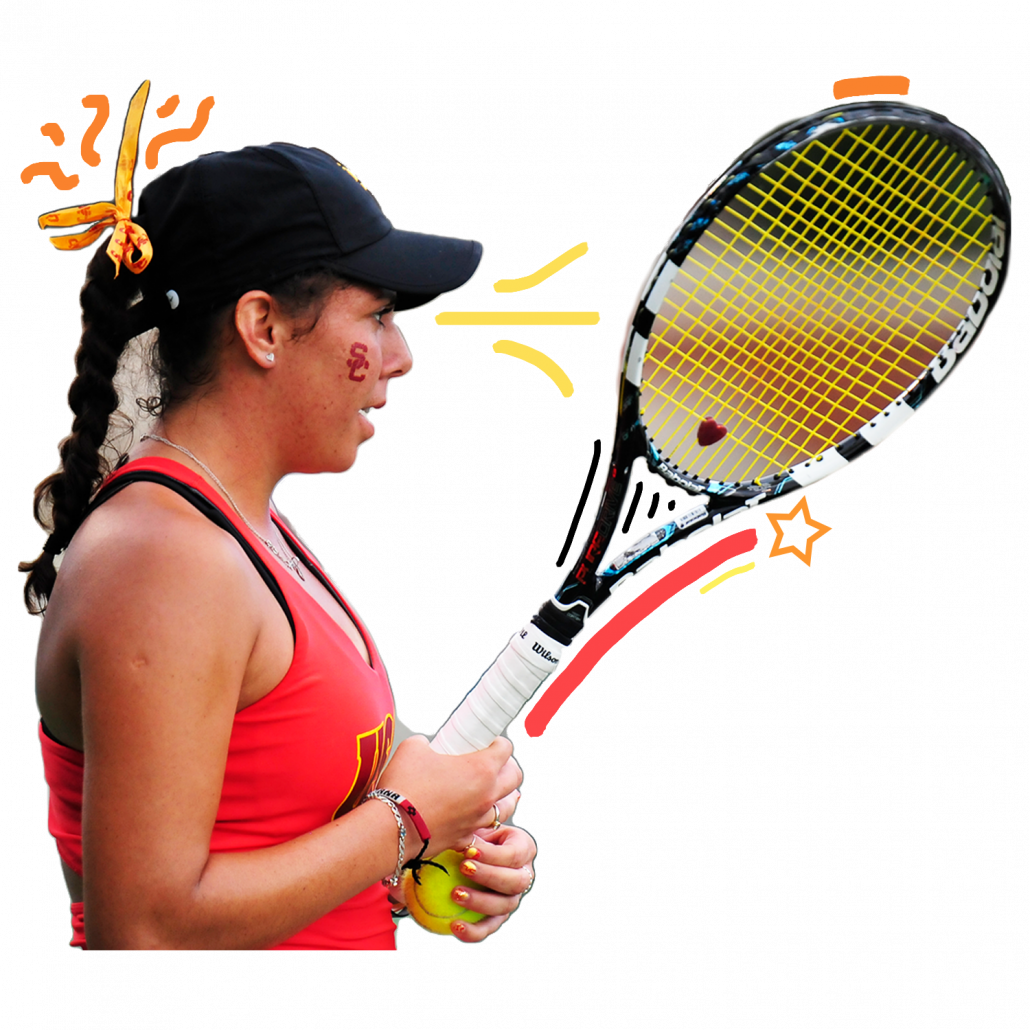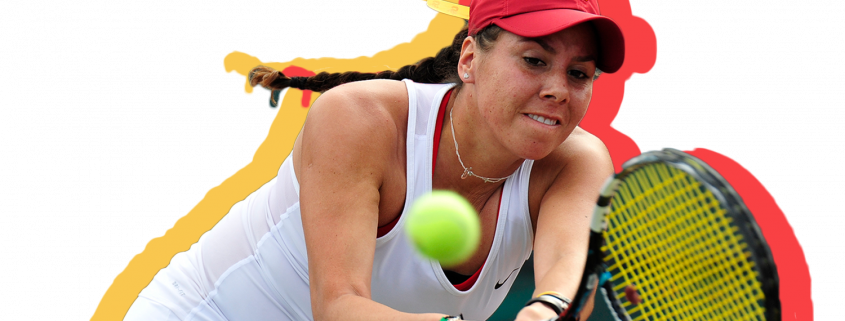Q&A: Tennis pro Gugu Olmos

Giuliana “Gugu” Olmos never planned to go to USC. In fact, she didn’t plan to go to college at all. Like many young tennis players, Olmos dreamt of playing professionally directly out of high school.
To Olmos and many others, going to college was seen as a step down since she wouldn’t be playing at the highest level immediately. However, now that she’s a professional and Women’s Tennis Association doubles title winner, Olmos can reflect on her past concerns about collegiate level tennis and dismiss them as misguided.
Now 27, Olmos is in the midst of a historic professional career. Though born in Austria and raised in California, Olmos represents her father’s birth country Mexico on an international level, which she’s done since she was just 16 years old. Olmos became the first Mexican player in the Open era to reach a WTA final at the Monterrey Open in 2018. A year later she became the first Mexican woman to win a WTA title, capturing the doubles championship at Nottingham in 2019.
Days before flying back to her home in California, Olmos talked to the Daily Trojan while visiting family in Austria.
Daily Trojan: So the recruiting process obviously started a little bit late for you, but when did you realize you might have to go to college? What made you fall in love with USC when you first came to visit?
Olmos: I started looking at colleges really late. Growing up, I thought if I went to college, [my career] was almost a failure. If I didn’t go pro right away, then I wasn’t going to make it. I think that was something really bad because going to college is not a failure.
I started looking at colleges [in] September of my senior year. I didn’t have that many options, but I also didn’t have bad options. I was talking to Cal, USC, North Carolina [and] Texas.
I liked the coaches [at USC], and it was also a really good school academically. That pulled me in. And the Trojan family, I heard all about it all the time. I thought it would be really cool to be a part of that. I actually had visits lined up to other schools after ’SC, but I didn’t visit any other school after that.
DT: At 16, you were asked to make the decision of who you were going to represent internationally. When did you first start thinking about it? How many voices contributed to that decision? Was it an easy decision for you?
GO: I never really thought about it. I was representing the U.S., and my dad is from Mexico. I was ranked [second] nationally at the time in the U.S. and Mexico didn’t have a lot of players and my dad knew a lot of people there.
They had the World Junior Championships coming up, and every country sends in their top three players. They offered me [the choice that] if I switched from the U.S. to Mexico, I could play that tournament. They offered to pick up my traveling expenses. As a junior, that was really important because tennis is a really expensive sport. I started traveling a lot internationally so that got really expensive and it just seemed like a really good opportunity for me at the time.
My dad was my coach at the time so he played a very big role, but I ended up switching. I was really happy I played World Junior Fed Cup, which was one of the coolest experiences of my life. I’ve been playing the professional Fed Cup ever since. I like playing for Mexico. It’s a lot of fun.

DT: When it comes to the responsibilities of being a professional, I don’t think any program can fully prepare you for what that’s like. What’s something that took you time to adjust or something no one told you about when you became a professional that you were taken aback by?
GO: The first one is when you travel in college, you travel with your team, so you always travel with eight to 10 people a week. You travel with your teammates, so you have your friends there all the time. It’s always fun. I think that was hard because when you go on the Pro Tour, it’s very individual. You’re by yourself. It’s tough.
The second thing is money. When you’re in college, the hotels are paid for, the flights are paid for. Everything is booked. You literally just show up, and all you have to do is play tennis, whereas on the road I had to learn. I didn’t realize how expensive things are, how much you have to plan in advance.
You don’t know if you’re going to get into certain tournaments or not. When do you buy your flights? Who do you travel with? Who do you play doubles with? How do you get there? What if they don’t provide transportation to the tournament from the airport? You have to book all of that. There’s just so many things that you take for granted in college because you don’t have to do [them].
DT: There’s been things that have come to light with USC recently that are a little bit troubling in terms of racial insensitivity, lack of diversity in certain areas and other scandals. I’m sure you’ve heard a lot of them. I just want to get your thoughts on the current state of the perception and your affiliation with the University and tennis program.
GO: I’m a very proud Trojan. I think even if not the best things happen, I am very proud and loyal to our school tennis-wise. I had the best four years of my life at ’SC and I would do it all over again if I could and I just want the girls who come after me to have that same experience or be able to say the same. As [for] our institution, I think we have a lot of room to grow. A lot of things have come to light this year and in the past few months. I think USC is very open, and I really respect how the Athletic Department is responding to everything. I think these are changes that we should have made years ago, but I think it’s good we’re finally starting to make them and having some of these difficult conversations.
DT: You’ve mentioned the importance of the Trojan family and giving back to the tennis program specifically and how crucial that is to you. What word of advice do you have for readers or young women aspiring to play sports on a professional level?
GO: I would say there’s only two things you need to do to make it, and they’re the hardest two things: Everyone needs to just believe in themselves and work, obviously, as hard as they can and just really commit and dedicate themselves to what they’re doing. But I think what’s more important than maybe reaching the goal is enjoying your journey [toward] the goal. We’re always looking forward to what’s next, the next tournament or the next match or where we’re going. I don’t think we often stop and take a look at how far we’ve come or appreciate the little things that we’ve had. Obviously [we’re] always trying to be better and reach our next goal but continuously stop and smell the roses and enjoy how far we’ve come.
Listen to Talkin’ Troy’s special episode on Giuliana “Gugu” Olmos here.

